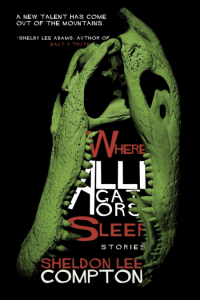160 pages, $18.00
Review by Denton Loving
“What is so interesting at your feet? It’s only your destiny,” writes Sheldon Lee Compton in his story, “Ouroboros,” which opens his new collection of flash fiction, Where Alligators Sleep. The question of destiny is perhaps the most over-arching theme in these 66 short shorts. In the title story, Compton crisscrosses time, depicting an elderly couple in 2008 who survive by remembering their first dance together in 1951. He writes, “There is sadness all around, spread out like mud through a hog pen.” In other words, destiny isn’t kind to any of us.
This tragic view of human suffering is depicted most uniquely in the story, “Assignment,” where physical and learning disabilities in students are likened to assignments drawn blindly from a bag. We all get one whether we want it or not.
One of the collection’s strongest threads is the difficult relationship between fathers and sons. At least nine stories by my count investigate this bond, sometimes from the father’s point of view and sometimes from the son’s. In my favorite of these, “Beating Them,” a boy named Ronnie practices passing the football with his father on an especially cold day. “Beating Them” is about that moment every man remembers in some form—when his father is working to toughen him up. We are already told that Ronnie’s fingers are blue when Compton writes:
“The football moved in a perfect spiral through the air, splitting the small flakes of snow on its way to Ronnie. Mesmerizing, hypnotic, slightly beautiful. He didn’t feel any pain when the ball hit him in the nose. Things went numb and then his face was full of heat and his neck was tingling and warm. Sticky wetness spread across his chest.”
And here, Compton perfectly captures that moment when Ronnie, like every son, has had enough: “Ronnie’s hands, his fingers, weren’t cold now. Nothing about him was cold. It was all red fury and blood moving quickly through his arms and legs. He thought he might toss the football aside and charge his father, all might and will and weak ambition and rage.”
Many of these stories are clearly drawn from Eastern Kentucky, where Compton lives and from where he’s written about in the past. These are stories about coal mines, faith healers, forgotten war heroes and substance abuse of all kinds. But other stories in Where Alligators Sleep show Compton’s clear ability to write as widely as he has always written deeply. “The Stars Are a Birthmark for Me” has a timeless, fantastical feel to it; the time depicted could be hundreds of years in the past or hundreds of years in the future. “When Ernesto Swam the Amazon” is set at a South American leper colony. Other stories investigate the lives of Billy the Kid and Andy Warhol. “He Was the Worst Man of His Name” depicts an Irish boxing match between two cousins.
One of the most powerful pieces in this collection is “Field Dressing a Man,” which delivers a certain grotesque quality but also reads like pure poetry:
“Field dressing a man is a basic and simple task, if you know what you’re doing. You’ll need only a sharp knife and a stomach that is not easily upset… Before you break the skin or bone or any internal parts, you must first be certain you’ve broken the spirit… think often of his heart, inches away, dead now, a perfect machine and beautiful and horrible.”
If these stories sound too frightening to read, hold close these lines from the story “Case,” where a train conductor has survived taking a tamping rod through the head: “It’s fear that makes us the most human. I’d trade a thousand peaceful evenings for one second of fear.” This train conductor—tamping bar and all—is a man after Sheldon Lee Compton’s own heart.
Where Alligators Sleep is Compton’s second collection following the 2012 release The Same Terrible Storm. Compton’s fiction has been published widely including here at [PANK]. (Also see Roxane Gay’s 2009 interview with Compton.) Fans of his work can look forward to the publication of his novella, Brown Bottle, scheduled for release in the summer of 2015 from Artistically Declined Press. Until then, readers should check out his online journal, Revolution John, where Compton published literature as gritty and compelling as what he writes himself.
***
Denton Loving is the author of the poetry collection, Crimes Against Birds (Main Street Rag, 2015), and editor of Seeking Its Own Level, an anthology of writings about water (MotesBooks, 2014). He serves as editor of drafthorse literary journal. Follow him on twitter @DentonLoving.
![[PANK]](https://pankmagazine.com/wp-content/themes/pank/assets/images/pank-logo-large.png)

